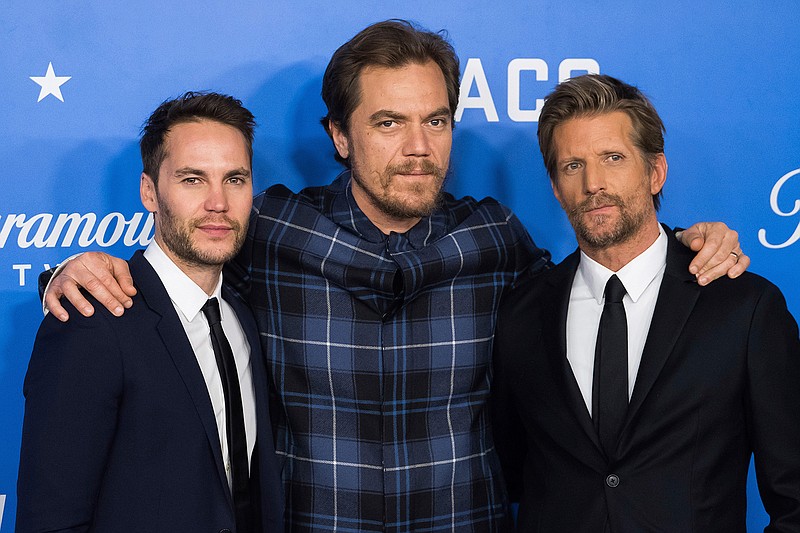Before it became the location famous for the cost-effective, shabby-turned-chic homes seen on HGTV's "Fixer Upper," Waco, Texas, was perhaps best known for the bungled 51-day siege near the city by federal law enforcement of cult leader David Koresh's Branch Davidian compound, which ended in tragedy in spring 1993.
A new Paramount Network six-part miniseries aims to remind viewers of-or, depending on the age, introduce them to-the harrowing standoff as the 25th anniversary nears.
"Waco" chronicles the days leading up to and the eventual storming of the apocalyptic religious sect's homestead by federal agents. The raid culminated in a deadly fire; in the end, four federal agents and more than 70 Branch Davidian members, including 17 children under age 10, died. In the months that followed, probes into the standoff called into question the tactics and judgment of federal officials on the case.
"Friday Night Lights" alum Taylor Kitsch stars as the charismatic cult leader, and Oscar-nominated actor Michael Shannon ("The Shape of Water," "Nocturnal Animals") plays FBI negotiator Gary Noesner.
The miniseries, which premiered last week, is a key property helping to shape the identity of the Paramount Network, a rebranding of Viacom's male-skewing Spike channel that launched last week, as a general entertainment destination. And it underscores how television programmers are eager to get a piece of the true-crime frenzy gripping viewers.
"The story of Waco is very important, historically, and very compelling," said Keith Cox, the network's president of development and programming. "For us, as we rebrand it was the perfect piece that we think will really speak to an audience. People love true crime. They just make for really gripping, emotional and riveting storytelling."
(The miniseries has had its own complicated history. The Weinstein Co. was one of its producers, but the producing credits were removed in the wake of the sexual harassment and rape allegations leveled against Harvey Weinstein.)
For writers John Erick Dowdle and Drew Dowdle, whose film credits include 2015's "No Escape" and 2010's "Devil," the journey to telling the story of the infamous standoff began four years ago as they were trying to flesh out a villain for an unrelated film script.
"We thought, 'What if he grew up in a cult, like the Branch Davidians?'" John Erick recalled. That led them to a book by David Thibodeau, one of the sect's surviving members, titled "A Place Called Waco."
"Five pages into it," John Erick said, "I called Drew and was, like, 'You have to read this.' It was totally different than what I remembered of the news accounts." They quickly came to the realization that unpacking the true story would be more compelling than their fiction.
"We find that people over the age of 35 tend to remember a distorted version of what really happened, the media narrative of the time," Drew said. "And people under the age of 35 largely don't know about it at all, or they've heard it loosely referenced. It was a story that was running the risk of being permanently erased in the history books in a distorted, untrue version. And to some extent, we wanted to tell a more balanced version of it."
The brothers knew they wanted to go beyond the news reports, because in their view, one of the major failures of the media was its distance from the action.
The duo interviewed agents from the Bureau of Alcohol, Tobacco and Firearms and the FBI, as well as theologians, lawyers and surviving Branch Davidian members in an attempt to offer both an inside view of what unfolded and multiple perspectives of the entities that battled it out over the nearly two-month ordeal. The pair also relied on "Stalling for Time: My Life as an FBI Hostage Negotiator," a book written by Noesner, for insight into the perspective of authorities. Both Thibodeau and Noesner served as consultants on the miniseries.
The Dowdles' goal was to present a "no bad guys" account that would challenge viewers' preconceptions.
"What we're saying is there's not one right side-it's not the FBI or the ATF or the Branch Davidians who are the bad guys," Drew said. "All three of those entities had complicated situations. It led to some very poor decisions, for sure."
"We wanted to see why people do the things they do," added John Erick.
For Kitsch, that meant not making a judgment call on whether Koresh was a stone-cold psychopath or a disturbed man with a troubled childhood in search of purpose.
"You didn't know what you were getting," Kitsch said. "That was fun to play, because I could turn a whole scene around if I wanted to, and it would be justifiable, because that guy wore his heart on his sleeve and was very emotional and manipulative. He was incredibly loving at times, and then at times just no bueno (not good) I don't think you'll ever fully understand the why."
In attempting to create a mutlidimensional portrait of all the players, the brothers have been criticized by those who believe they underplay the allegations of child abuse, including statutory rape, made against Koresh and the sect's members.
The Dowdles acknowledge they don't spend a lot of time exploring the topic, in part because it was "tricky"-while they believe that Koresh, who operated with an Old Testament mind-set, was guilty of statutory rape, they felt that other reports of physical abuse were overblown or inconclusive.

